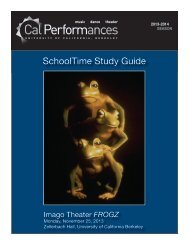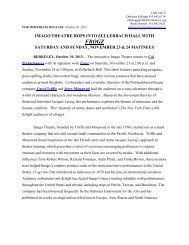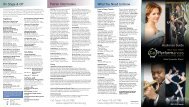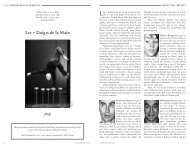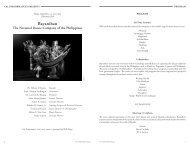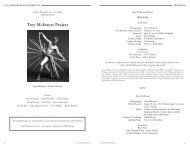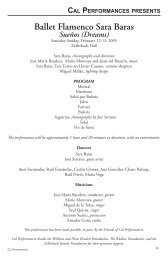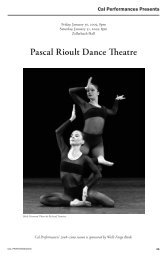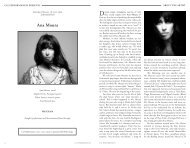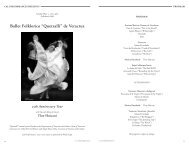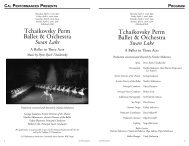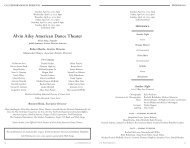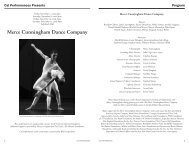Frederica von Stade, mezzo-soprano - Cal Performances
Frederica von Stade, mezzo-soprano - Cal Performances
Frederica von Stade, mezzo-soprano - Cal Performances
Create successful ePaper yourself
Turn your PDF publications into a flip-book with our unique Google optimized e-Paper software.
<strong>Cal</strong> <strong>Performances</strong> Presents<br />
Sunday, April 29, 2007, 3pm<br />
Hertz Hall<br />
Th eater in Song<br />
Music by Jake Heggie & Ricky Ian Gordon<br />
with special guest artist<br />
<strong>Frederica</strong> <strong>von</strong> <strong>Stade</strong>, <strong>mezzo</strong>-<strong>soprano</strong><br />
Jake Heggie & Ricky Ian Gordon, piano<br />
Kristin Clayton, <strong>soprano</strong><br />
Marnie Breckenridge, <strong>soprano</strong><br />
Zheng Cao, <strong>mezzo</strong>-<strong>soprano</strong><br />
Nicholas Phan, tenor<br />
Kyle Ferrill, baritone<br />
Dawn Harms, violin<br />
Carla-Maria Rodrigues, viola<br />
Emil Miland, cello<br />
* * *<br />
PROGRAM<br />
Part One<br />
Music by Jake Heggie (b. 1961)<br />
I.<br />
At the Statue of Venus (2005)<br />
Libretto by Terrence McNally<br />
West Coast Premiere<br />
Kristin Clayton, <strong>soprano</strong>; Jake Heggie, piano<br />
<strong>Cal</strong> <strong>Performances</strong>’ 2006–2007 season is sponsored by Wells Fargo.<br />
CAL PERFORMANCES 1
Program<br />
2<br />
II.<br />
Four Songs from Winter Roses (2004)<br />
Winter Roses (Charlene Baldridge)<br />
Sleeping (Raymond Carver)<br />
To My Dad (<strong>Frederica</strong> <strong>von</strong> <strong>Stade</strong>)<br />
Sweet Light (Carver)<br />
<strong>Frederica</strong> <strong>von</strong> <strong>Stade</strong>, <strong>mezzo</strong>-<strong>soprano</strong>; Jake Heggie, piano<br />
III.<br />
Here and Gone (2005)<br />
West Coast Premiere<br />
Th e Farms of Home (A. E. Housman)<br />
In Praise of Songs Th at Die (Vachel Lindsay)<br />
Stars (Housman)<br />
Th e Factory Window Song (Lindsay)<br />
In the Morning (Housman)<br />
Because I Liked You Better (Housman)<br />
Th e Half Moon Westers Low (Housman)<br />
Nicholas Phan, tenor; Kyle Ferrill, baritone;<br />
Dawn Harms, violin; Carla-Maria Rodrigues, viola;<br />
Emil Miland, cello; Jake Heggie, piano<br />
INTERMISSION<br />
Part Two<br />
Music by Ricky Ian Gordon (b. 1956)<br />
Ring-a-Ding-Ding, from Dream True (1998)<br />
Ricky Ian Gordon & Jake Heggie, piano four hands<br />
New Moon (Langston Hughes)<br />
Marnie Breckenridge, <strong>soprano</strong>; Zheng Cao, <strong>mezzo</strong>-<strong>soprano</strong>;<br />
Nicholas Phan, tenor; Kyle Ferrill, baritone;<br />
Ricky Ian Gordon, piano<br />
Joy (Hughes)<br />
Marnie Breckenridge, <strong>soprano</strong>; Ricky Ian Gordon, piano<br />
A Contemporary (W. S. Merwin)<br />
Nicholas Phan, tenor; Ricky Ian Gordon, piano<br />
CAL PERFORMANCES
Th ree Floors (Stanley Kunitz)<br />
Kyle Ferrill, baritone; Ricky Ian Gordon, piano<br />
Open All Night (James Agee)<br />
Zheng Cao, <strong>mezzo</strong>-<strong>soprano</strong>; Ricky Ian Gordon, piano<br />
Sometimes, from My Life with Albertine (2003)<br />
(lyrics by Ricky Ian Gordon & Richard Nelson)<br />
Nicholas Phan, tenor; Kyle Ferrill, baritone; Ricky Ian Gordon, piano<br />
Th e Red Dress (Dorothy Parker)<br />
Marnie Breckenridge, <strong>soprano</strong>; Ricky Ian Gordon, piano<br />
Bus Stop (Donald Justice)<br />
Kyle Ferrill, baritone; Ricky Ian Gordon, piano<br />
Souvenir (Edna St. Vincent Millay)<br />
Zheng Cao, <strong>mezzo</strong>-<strong>soprano</strong>; Ricky Ian Gordon, piano<br />
Heaven (Hughes)<br />
Nicholas Phan, tenor; Ricky Ian Gordon, piano<br />
Dream True (Tina Landau), from Dream True<br />
Nicholas Phan, tenor; Kyle Ferrill, baritone;<br />
Ricky Ian Gordon & Jake Heggie, pianos<br />
Resumé/Wail/Frustration (Dorothy Parker),<br />
from Autumn Valentine (1992)<br />
Zheng Cao, <strong>mezzo</strong>-<strong>soprano</strong>; Kyle Ferrill, baritone;<br />
Ricky Ian Gordon & Jake Heggie, pianos<br />
Virginia Woolf (James Schuyler)<br />
Zheng Cao, <strong>mezzo</strong>-<strong>soprano</strong>; Ricky Ian Gordon, piano<br />
Poem (Frank O’Hara)<br />
Marnie Breckenridge, <strong>soprano</strong>; Ricky Ian Gordon, piano<br />
Will Th ere Really Be a Morning? (Emily Dickinson)<br />
<strong>Frederica</strong> <strong>von</strong> <strong>Stade</strong>, <strong>mezzo</strong>-<strong>soprano</strong>;<br />
Marnie Breckenridge & Kristin Clayton, <strong>soprano</strong>s;<br />
Zheng Cao, <strong>mezzo</strong>-<strong>soprano</strong>; Nicholas Phan, tenor;<br />
Kyle Ferrill, baritone; Ricky Ian Gordon, piano<br />
Program<br />
CAL PERFORMANCES 3
Program Notes<br />
Jake Heggie<br />
Th e theatrical journey of a song has always<br />
fascinated me. It was during the composing of<br />
Dead Man Walking that I realized with great<br />
joy that I’m a theater composer. It then became<br />
clear to me why I was drawn to certain texts<br />
and stories: because they are innately theatrical<br />
and transformative. Ricky Ian Gordon has<br />
that same response to text. We became friends a<br />
few years ago, when we shared a concert at the<br />
Ravinia Festival, and our friendship has become<br />
a source of support and joy for both of us. Last<br />
year, we shared another concert at Carnegie<br />
Hall and then at the Library of Congress. When<br />
Robert Cole asked me about being part of the<br />
Composer Portrait series, I suggested a program<br />
shared with Ricky. We have a mutual admiration<br />
society, and I feel our styles complement<br />
each other’s very well. Besides that, we have so<br />
much damn fun together, and there is sheer joy<br />
in the music-making.<br />
For my half of the program, I wanted to<br />
present big scenes and cycles that off er a theatrical<br />
arc. At the Statue of Venus was my fi rst<br />
collaboration with Terrence McNally after Dead<br />
Man Walking in 2000. We were asked to create a<br />
new piece for the opening of the Ellie Caulkins<br />
Opera House in Denver for September 2005.<br />
We were both deeply honored and hugely challenged<br />
by that great honor. We decided to write<br />
a scene inspired by the great concert scenas of<br />
Haydn, Mozart, Beethoven and Britten. An attractive<br />
woman waits in a museum by a statue of<br />
the Goddess of Love to meet a man she has never<br />
seen. Her thoughts and emotions are a jumble<br />
of hope, uncertainty and self-doubt. Will he<br />
like her? Will she like him? Why did she—a<br />
proudly successful modern woman, probably<br />
divorced—allow her friends to convince her<br />
that they had found a Mr. Right for her? We<br />
all know that Mr. Right doesn’t exist—or does<br />
he? Nothing ventured, nothing gained. To be<br />
willing to be judged by another person—does<br />
anything make us more vulnerable but human,<br />
too? Th e piece was commissioned by Jeremy and<br />
4<br />
Susan Shamos for Opera Colorado and received<br />
its premiere September 10, 2005, with <strong>soprano</strong><br />
Kristin Clayton and pianist Jake Heggie.<br />
Winter Roses was commissioned by Luci and<br />
Richard Janssen for <strong>Frederica</strong> <strong>von</strong> <strong>Stade</strong> and<br />
Camerata Pacifi ca in 2004. Th e cycle features<br />
poetry by Charlene Baldridge, Emily Dickinson,<br />
Raymond Carver and <strong>Frederica</strong> <strong>von</strong> <strong>Stade</strong>. I<br />
have been collaborating with Flicka (Ms. <strong>von</strong><br />
<strong>Stade</strong>) since 1994, when she began championing<br />
my songs. She and I have worked together extensively,<br />
and it has been one of the most deeply<br />
meaningful collaborations and friendships of my<br />
life. When I received this commission to create<br />
something for her, I asked if it would be all right<br />
to base it on her own personal struggle to come<br />
to terms with the loss of her father in World War<br />
II before she was born. She agreed, and then did<br />
me the honor of writing two of the texts. To<br />
make the cycle more universal, I structured it so<br />
that it tells the story of somebody who has lost<br />
a loved one too soon, too young. Th e poetry of<br />
Charlene Baldridge set it all in motion, and the<br />
fantastic words of Raymond Carver summed it<br />
all up.<br />
Here and Gone was commissioned by the<br />
Ravinia Festival for the Steans Institute in 2005.<br />
Th e cycle is a deeply personal journey of missed<br />
connections and unrequited love between two<br />
men. Th is is told through the beautiful poetry<br />
of the British poet A. E. Housman and the<br />
American writer Vachel Lindsay, who lived at<br />
about the same time and touched on similar<br />
themes in their writings. Th e piece received its<br />
premiere in August 2005 with tenor Nicholas<br />
Phan and baritone Andrew Garland.<br />
Ricky Ian Gordon<br />
Th e truth is, because I saw that Jake was doing<br />
cycles and behaving in a very organized manner,<br />
I thought it would be a fun and interesting<br />
contrast, to make the second half sort of a mélange—well,<br />
even, if you will, a hodgepodge. I<br />
knew we had four singers, my request from the<br />
CAL PERFORMANCES
eginning, so I thought of doing solos and ensembles<br />
in diff erent combinations. Some of the<br />
songs are from theater pieces I have written, as<br />
listed, and some are just single songs, poetry settings,<br />
and some are from cycles…but here, they<br />
are put together in my own skewed logic to tell<br />
what ever story they tell in this order, not only<br />
about me and my work, but about the poets and<br />
the performers. Th e only two songs that I believe<br />
need a little context, are “Sometimes” from My<br />
Life with Albertine and “Dream True,” from the<br />
show of the same title.<br />
My Life with Albertine was written with<br />
Richard Nelson using sections from Marcel<br />
Proust’s Remembrance of Th ings Past. It is about<br />
young Marcel’s obsession with the both attainable<br />
and very unattainable Albertine…and<br />
here, in this song, “Sometimes,” both the young<br />
Marcel and his older self, watch the exquisitely<br />
beautiful Albertine take a nap. Afterwards, a<br />
trio of women (sirens) sing of their obsession<br />
with Albertine as well, the same song in a slightly<br />
diff erent version, thus, letting Marcel in on<br />
a little secret…Albertine sleeps around, and not<br />
just with men!<br />
Program Notes<br />
In “Dream True,” we meet Peter Emmons<br />
(Peppy) and Vernon Dexter (Verne) who were<br />
close childhood friends in Wyoming, tragically<br />
separated at a tender age, and traumatized by it.<br />
As children, they discovered a kind of dreaming<br />
that enabled them to be together in their dreams.<br />
After years of separation, an accidental meeting<br />
and sighting puts them back in each other’s<br />
lives, and this duet song is their rediscovery of<br />
one another, and of “dreaming true” again.<br />
Th e songs, poetry settings, stand on their<br />
own, I believe…but perhaps, in the case of<br />
“Th ree Floors,” it might be helpful to know, that<br />
when Stanley Kunitz’s mother was pregnant<br />
with him, and very close to giving birth, his father<br />
shot himself in the head with a rifl e, in a<br />
public park!…so the dominant topic pervading<br />
many of his poems is the absent father he never<br />
met, who died so violently and inauspiciously.<br />
One other thought…when James Schuyler<br />
wrote “Virginia Woolf,” he was suff ering from<br />
the same form of depression that drove Woolf<br />
to suicide, but the medical treatment that saved<br />
Schuyler was not available in her time. His poem<br />
is one of compassion from one artist to another.<br />
CAL PERFORMANCES 5
Texts<br />
Jake Heggie (b. 1961)<br />
6<br />
I.<br />
At the Statue of Venus<br />
Libretto by Terrence McNally<br />
A WOMAN enters. Her name is ROSE. She wears well-cut black<br />
slacks, low heels and a crisp white blouse with a reasonable<br />
cleavage. A modest necklace and earrings complete her look,<br />
which is best described as open, honest, direct. She stands<br />
a moment, looking around and getting her bearings, then<br />
looks at her watch and begins to wait.<br />
rose:<br />
Th e slacks were a mistake. Too late now. Brazen it out.<br />
Look him in the eye, make him see what you want him<br />
to see. It’s not about how you’re dressed, it’s about who<br />
you are, and who I am right now is a woman who wishes<br />
she wasn’t wearing slacks. Weren’t wearing slacks. Wasn’t<br />
wearing slacks. Weren’t. Wasn’t. Whatever!<br />
God, I hate that expression. What if he uses it all the<br />
time? I’ll kill myself.<br />
Meeting a blind date at the statue of Venus, wearing<br />
black slacks. Way to go, Rose.<br />
What were my options? Th e yellow dress? Too cheerful.<br />
Black is so severe. Th e blue Chanel was perfect. But it<br />
looks expensive. It was expensive. Why am I suddenly so<br />
embarrassed I can aff ord my own clothes?<br />
I’m too old for this. I haven’t felt this way since high<br />
school. I’m being judged for all the wrong reasons. What<br />
on earth possessed me to wear slacks?<br />
It was a sexy voice: “I’ll meet you at the statue of Venus.<br />
Let’s say fi ve-ish, shall we?”<br />
I liked the “shall we?” Th e “fi ve-ish” not so much. Don’t<br />
gay men say “fi ve-ish”? My friends would never do that<br />
to me. “You two should meet. You’re really perfect for<br />
each other. He’s a Pisces. You’re a Scorpio. You both love<br />
the ballet.” Another warning sign? No. Lots of straight<br />
men like the ballet. Name one, Rose. Name one. If he’s<br />
gay it won’t matter I wore the slacks.<br />
Look at all those women. Out with friends.<br />
Looking at art.<br />
Look at all those women. Happy.<br />
Able to be who they are, not meeting a stranger at the<br />
statue of Venus.<br />
Was a real woman this artist’s inspiration? Or was she<br />
imagined?<br />
Look at the way he expressed her beauty.<br />
How must it feel to be idealized and treasured? A woman<br />
beyond measure.<br />
I love the way he saw into her heart. Look at all these<br />
women!<br />
Th ere’s a woman as seen by Titian.<br />
Th ere, another woman as painted by Matisse.<br />
Manet, Monet, Degas,<br />
Warhol, DeKooning, Chagall.<br />
All so beautiful. All inspired.<br />
Who wouldn’t want to be loved like that? A source of<br />
inspiration.<br />
And knowing someone once saw in you a masterpiece.<br />
A masterpiece. What will he see in me?<br />
Look at all those women. Any other day there I’d be,<br />
One of all those women passing by, hardly glancing at<br />
Venus.<br />
But not today, I’m trying to see myself the way he’ll see<br />
me:<br />
A woman. Just a woman in slacks hoping for love.<br />
* * *<br />
It’s him. It’s him! No, it’s not. I wish I were dead. No,<br />
invisible, so I could be looking at him the way he’ll be<br />
looking at me.<br />
(Looking at “the man”)<br />
Th ere’s a bald spot. You know, a few hours at the gym<br />
wouldn’t exactly kill you, either.<br />
You say you voted for who? I just can’t imagine why our<br />
friends thought I might like you.<br />
It’s him. Coming straight toward me.<br />
Oh God, please let it be him. Th is is the moment.<br />
He’s beyond my wildest dreams. Th is is the one.<br />
Th ere he is, even more handsome than I pictured he’d<br />
be.<br />
A face to match the voice on the phone: sexy and gentle.<br />
He’s here, though not on time. Not on the minute.<br />
But now there’s no waiting, no more fear,<br />
He’s fi nally here. And now I can breathe again.<br />
Th is is the.<br />
Th is is a man greeting another woman in slacks.<br />
Not me.<br />
Life is not fair. But wait, here’s another one.<br />
Oh God don’t let it be him, this is a nightmare.<br />
Th is is exactly what I was afraid of. Run for your life!<br />
CAL PERFORMANCES
Here he comes. Nowhere to hide, and I’m stuck by this<br />
stupid Greek statue.<br />
Maybe it’s not. Too late, it’s him!<br />
Th e what? Th e men’s room? I wouldn’t know. I don’t<br />
work here.<br />
Th e slacks just make me look like it. Life is not fair.<br />
What if he’s been here and gone? Seen me and changed<br />
his mind?<br />
I’ve been judged and found lacking without a defense.<br />
Well maybe you’re not to my liking either, whoever-youare-thinking-your-God-almighty,<br />
judging and leaving<br />
and making me wonder if it’s me or the slacks as I stand<br />
here and wait for a date I don’t want at the statue of<br />
Venus. At the statue of Venus! I have a judgment for you:<br />
not so terrifi c yourself. I’m leaving.<br />
* * *<br />
If I leave now, I’ll never know. And where am I going?<br />
At night we dream of love, of loving and being loved,<br />
Like when we were children, if we were lucky, as I was.<br />
I knew my parents loved me, and I loved them.<br />
I felt safe and protected.<br />
I knew that morning would always come,<br />
And I knew I was loved.<br />
Oh God, I was a lucky, lucky child.<br />
Sunday night dinners over at Grandma’s, we’d all be<br />
together.<br />
Playing piano, singing along, not in tune or too much<br />
in measure.<br />
Wrestling with cousins. Th e stories we’d share. Th e night<br />
Randall kissed me.<br />
Th en pretending to sleep in the car riding home with my<br />
father and mother.<br />
Wanting to hear the secrets they’d share,<br />
But mostly just wanting to be carried upstairs in my<br />
father’s arms,<br />
Th en he’d kiss me and say:<br />
“Good night, my little pumpkin.<br />
Sleep soundly, my little love.<br />
Angel from heaven.<br />
Star from above.” And I’d sleep.<br />
Th at love is what I’m seeking;<br />
To feel again I am safe and protected.<br />
To wake each morning fi lled with hope.<br />
And to know I am loved.<br />
Oh God, I was a lucky, lucky child.<br />
* * *<br />
Texts<br />
Will I know him? Of course I will. He’ll be a man I can<br />
laugh with and be myself with.<br />
He’ll be handsome which only means when I look at him<br />
my heart will smile, and I’ll feel happy to the tips of my<br />
fi ngers. Th at’s all “handsome” is: happiness.<br />
How will he know me? Th at’s easy.<br />
He’ll listen for my laughter and be happy to know he’s<br />
the reason I laugh.<br />
He will know the vastness and fullness of my heart.<br />
Together we’ll know beauty and drink of it deeply, over<br />
and over.<br />
We will keep each other hopeful and brave.<br />
Together. We will brave this world together, the rest of<br />
our days.<br />
I’ll meet you at the statue of Venus.<br />
accompanist/conductor: Rose?<br />
rose: Yes?<br />
the end<br />
please turn page quietly<br />
CAL PERFORMANCES 7<br />
II.<br />
Four Songs from Winter Roses<br />
Winter Roses<br />
Text by Charlene Baldridge<br />
Winter roses are saddest of all,<br />
seldom knowing a full fl owering before frost comes.<br />
My edges are sere and unintentional as theirs.<br />
I am content to drift, to walk in early morning; to ponder<br />
love.<br />
Ponder my own love, so long ago, when I held my fi rst<br />
babe.<br />
Ponder Mary. My grief, my loneliness nothing, compared<br />
to hers.<br />
Perhaps love only seems to fade for a time.<br />
Perhaps it will redeem the world, eventually.<br />
Amen.<br />
Sleeping<br />
Text by Raymond Carver<br />
He slept on his hands.<br />
On a rock.<br />
On his feet.<br />
On someone else’s feet.
Texts<br />
He slept on buses, trains, in airplanes.<br />
Slept on duty.<br />
Slept beside the road.<br />
Slept on a sack of apples.<br />
He slept in a pay toilet.<br />
In a hayloft.<br />
In the Super Dome.<br />
Slept in a Jaguar, and in the back of a pickup.<br />
Slept in theaters.<br />
In jail.<br />
On boats.<br />
He slept in line shacks and, once, in a castle.<br />
Slept in the rain.<br />
In the blistering sun he slept.<br />
On horseback.<br />
He slept in chairs, churches, in fancy hotels.<br />
He slept under strange roofs all his life.<br />
Now he sleeps under the earth.<br />
Sleeps on and on.<br />
Like an old king.<br />
To My Dad<br />
Text by <strong>Frederica</strong> <strong>von</strong> <strong>Stade</strong><br />
I hope you don’t mind that I don’t miss you.<br />
For I don’t miss you.<br />
I’ve come too far for longing. And I don’t miss you.<br />
I am a diff erent soul now. We’ve little left to share.<br />
I’ll never know your fear, your hurt, your pain<br />
To die so far away from all you love you.<br />
So many love you.<br />
You’ll never know my fear, my hurt, my pain<br />
To live so far from you.<br />
Sweet Light<br />
Text by Raymond Carver<br />
After the winter, grieving and dull,<br />
I fl ourished here all spring. Sweet light<br />
began to fi ll my chest. I pulled up<br />
a chair. Sat for hours in front of the sea.<br />
Listened to the buoy and learned<br />
To tell the diff erence between a bell,<br />
And the sound of a bell. I wanted<br />
Everything behind me. I even wanted<br />
To become inhuman. And I did that.<br />
I know I did. (She’ll back me up on this.)<br />
I remember the morning I closed the lid<br />
on memory and turned the handle.<br />
8<br />
Locking it away forever.<br />
Nobody knows what happened to me<br />
out here, sea. Only you and I know.<br />
At night, clouds form in front of the moon.<br />
By morning they’re gone. And that sweet light<br />
I spoke of? Th at’s gone, too.<br />
“Winter Roses” © 1990 by Charlene Baldrige. Used by<br />
permission.<br />
“To My Dad” © 2004 by <strong>Frederica</strong> <strong>von</strong> <strong>Stade</strong>. Used by<br />
permission.<br />
“Sleeping” and “Sweet Light” published in All of Us: Th e<br />
Collected Poems of Raymond Carver (Th e Harvill Press<br />
& Knopf, 1989) © Raymond Carver 1986, 1988; © Tess<br />
Gallagher 1996, 2004. Used by permission.<br />
III.<br />
Here and Gone<br />
Poetry by A. E. Housman and Vachel Lindsay<br />
Th e Farms of Home<br />
Text by Housman<br />
Th e farms of home lie lost in even,<br />
I see far off the steeple stand;<br />
West and away from here to heaven<br />
Still is the land.<br />
Th ere if I go no girl will greet me,<br />
No comrade hollo from the hill,<br />
No dog run down the yard to meet me:<br />
Th e land is still.<br />
Th e land is still by farm and steeple,<br />
And still for me the land may stay:<br />
Th ere I was friends with perished people,<br />
And there lie they.<br />
In Praise of Songs Th at Die<br />
Text by Lindsay<br />
Ah, they are passing, passing by,<br />
Wonderful songs, but born to die!<br />
Cries from the infi nite human seas,<br />
Waves thrice-winged with harmonies.<br />
Here I stand on a pier in the foam<br />
Seeing the songs to the beach go home,<br />
Dying in sand while the tide fl ows back,<br />
CAL PERFORMANCES
As it fl owed of old in its fated track.<br />
Oh, hurrying tide that will not hear<br />
Your own foam-children dying near:<br />
Is there no refuge-house of song,<br />
No home, no haven where songs belong?<br />
Oh, precious hymns that come and go!<br />
You perish, and I love you so!<br />
Stars<br />
Text by Housman<br />
Stars, I have seen them fall,<br />
But when they drop and die<br />
No star is lost at all<br />
From all the star-sown sky.<br />
Th e toil of all that be<br />
Helps not the primal fault;<br />
It rains into the sea,<br />
And still the sea is salt.<br />
Th e Factory Window Song<br />
Text by Lindsay<br />
Factory windows are always broken.<br />
Somebody’s always throwing bricks,<br />
Somebody’s always heaving cinders,<br />
Playing ugly Yahoo tricks.<br />
Factory windows are always broken.<br />
Other windows are let alone.<br />
No one throws through the chapel-window<br />
Th e bitter, snarling, derisive stone.<br />
Factory windows are always broken.<br />
Something or other is going wrong.<br />
Something is rotten—I think, in Denmark.<br />
End of the factory-window song.<br />
In the Morning<br />
Text by Housman<br />
In the morning, in the morning,<br />
In the happy fi eld of hay,<br />
Oh they looked at one another<br />
By the light of day.<br />
In the blue and silver morning<br />
On the haycock as they lay,<br />
Oh they looked at one another<br />
And they looked away.<br />
Because I Liked You Better<br />
Text by Housman<br />
Because I liked you better<br />
Th an suits a man to say,<br />
It irked you, and I promised<br />
To throw the thought away.<br />
To put the world between us<br />
We parted, stiff and dry;<br />
“Good-bye,” said you, “forget me.”<br />
“I will, no fear,” said I.<br />
If here, where clover whitens<br />
Th e dead man’s knoll, you pass,<br />
And no tall fl ower to meet you<br />
Starts in the trefoiled grass,<br />
Halt by the headstone naming<br />
Th e heart no longer stirred.<br />
And say the lad that loved you<br />
Was one that kept his word.<br />
Th e Half-Moon Westers Low<br />
Text by Housman<br />
Th e half-moon westers low, my love,<br />
And the wind brings up the rain;<br />
And wide apart lie we, my love,<br />
And seas between the twain.<br />
I know not if it rains, my love,<br />
In the land where you do lie;<br />
And oh, so sound you sleep, my love,<br />
You know no more than I.<br />
INTERMISSION<br />
Ricky Ian Gordon (b. 1956)<br />
Ring-a-Ding-Ding<br />
For piano four hands<br />
New Moon<br />
Text by Langston Hughes<br />
Th ere’s a new young moon<br />
Riding the hills tonight.<br />
Th ere’s a sprightly young moon<br />
Texts<br />
please turn page quietly<br />
CAL PERFORMANCES 9
Texts<br />
Exploring the clouds.<br />
Th ere’s a half shy young moon<br />
Veiling her face like a virgin<br />
Waiting for a lover.<br />
Joy<br />
Text by Langston Hughes<br />
I went to look for Joy,<br />
Slim, dancing Joy,<br />
Gay, laughing Joy,<br />
Bright-eyed Joy—<br />
And I found her<br />
Driving the butcher’s cart<br />
In the arms of the butcher boy!<br />
Such company, such company,<br />
As keeps this young nymph, Joy!<br />
A Contemporary<br />
Text by W. S. Merwin<br />
What if I came down now out of these<br />
solid dark clouds that build up against the mountain<br />
day after day with no rain in them<br />
and lived as one blade of grass<br />
in a garden in the south when the clouds part in winter<br />
from the beginning I would be older than all the<br />
animals<br />
and to the last I would be simpler<br />
frost would design me and dew would disappear on me<br />
sun would shine through me<br />
I would be green with white roots<br />
feel worms touch my feet as a bounty<br />
have no name and no fear<br />
turn naturally to the light<br />
know how to spend the day and night<br />
climbing out of myself<br />
all my life<br />
Th ree Floors<br />
Text by Stanley Kunitz<br />
Mother was a crack of light<br />
and a grey eye peeping.<br />
I made believe by breathing hard<br />
that I was sleeping.<br />
Sister’s doughboy on last leave<br />
had robbed me of her hand.<br />
Downstairs at intervals<br />
she played “Wa-rum” on the baby grand.<br />
10<br />
Under the roof a wardrobe trunk<br />
whose lock a boy could pick<br />
contained a red masonic hat<br />
and a walking stick.<br />
Bolt up-ight in my bed that night<br />
I saw my father fl ying;<br />
the wind was walking on my neck,<br />
the windowpanes were crying.<br />
Open All Night<br />
Text by James Agee<br />
Wake up Th reeish,<br />
Clean up the sink<br />
Air out the bedroom<br />
Pour out a drink<br />
Drink to the daylight<br />
Sit down and think<br />
I’m Open All Night.<br />
Go to the movies,<br />
Stroll in the park<br />
Watch the kids playing<br />
Wait for the dark,<br />
Th en I remember<br />
A fellow named Clark<br />
I’m Open All Night.<br />
Buy me a mirror<br />
Make up the bed<br />
Order the white rock<br />
Get myself fed<br />
Prink up and sit down<br />
And wish I was dead<br />
I’m Open All Night.<br />
Sometimes, from My Life with Albertine<br />
Text by Ricky Ian Gordon & Richard Nelson<br />
Sometimes<br />
I watch her take off her clothes<br />
and throw them on a chair.<br />
Sometimes…<br />
Sometimes<br />
I will put out the lights and sit<br />
and watch her there.<br />
Sometimes…<br />
Her hair caresses me so<br />
like the wing of a morning dove<br />
Inside my mouth<br />
is her tongue,<br />
CAL PERFORMANCES
Now this is what I call true love.<br />
Sometimes<br />
I unbutton her chemise<br />
before we go to bed.<br />
Sometimes…<br />
Sometimes I kiss her little breasts<br />
until I am well fed<br />
Sometimes…<br />
Sometimes I touch the hollow that lies<br />
between the thighs.<br />
Sometimes I open wide the door<br />
I’ll hear the hinges sigh<br />
Sometimes! Sometimes! Sometimes!<br />
Sometimes<br />
I touch and watch<br />
as two white legs<br />
like swans necks bend<br />
Oh, sometimes.<br />
Sometimes they push up hard<br />
and then back down again.<br />
Sometimes.<br />
Summer<br />
Text by Ricky Ian Gordon<br />
Summer.<br />
Will you be there to meet me,<br />
when I am in my white dress,<br />
and I am picking fl owers?<br />
Summer.<br />
Th e sun beats at the window.<br />
A lady comes here calling<br />
and we can talk for hours.<br />
Summer.<br />
A child spilling soda,<br />
and slamming shut the screen door,<br />
while mother dries the china.<br />
Summer.<br />
Th e heat is like a curtain<br />
that willows in the lamplight<br />
between the Carolinas.<br />
Th e baby’s always sticky,<br />
and daddy’s always singing,<br />
but mama forgot how!<br />
I wish it were summer now.<br />
Summer.<br />
Th e nakedness, the linen.<br />
You touched me and I shivered.<br />
Th e night became an echo.<br />
Summer.<br />
A change in the upholstery,<br />
the fi refl ies, the crickets,<br />
the neighbor with the hose,<br />
and watching father doze,<br />
my hair up off my neck,<br />
the wicker on the deck,<br />
Oh!<br />
Summer.<br />
Remember at the seashore<br />
the sunlight’s blinding shimmer,<br />
and later when we parted?<br />
Summer.<br />
I hold you in my pillow.<br />
Th e dawn begins to glimmer,<br />
and I am open-hearted.<br />
December is forgotten<br />
Th e August breezes sizzle.<br />
No trouble on my brow.<br />
I wish it were summer now.<br />
Summer.<br />
Th e sand and salty ocean<br />
become a sort of potion,<br />
but seasons take their bow.<br />
I wish it were summer now.<br />
Th e Red Dress<br />
Text by Dorothy Parker<br />
I always saw, I always said<br />
If I were grown and free,<br />
I’d buy a gown of reddest red<br />
As fi ne as you could see,<br />
To wear out walking, sleek and slow,<br />
Upon a Summer day,<br />
And there’s be one to see me so<br />
And fl ip the world away.<br />
And he would be a gallant one,<br />
With stars behind his eyes,<br />
And hair like metal in the sun,<br />
And lips too warm for lies.<br />
I always saw us, gay and good,<br />
High honored in the town.<br />
Now I am grown to womanhood…<br />
I have the silly gown.<br />
Texts<br />
please turn page quietly<br />
CAL PERFORMANCES 11
Texts<br />
Bus Stop<br />
Text by Donald Justice<br />
Lights are burning<br />
In quiet rooms<br />
Where lives go on<br />
Resembling ours.<br />
Th e quiet lives<br />
Th at follow us—<br />
Th ese lives we lead<br />
But do not own—<br />
Stand in the rain<br />
So quietly<br />
When we are gone,<br />
So quietly…<br />
And the last bus<br />
Comes letting dark<br />
Umbrellas out—<br />
Black fl owers, black fl owers.<br />
And lives go on.<br />
And lives go on<br />
Like sudden lights<br />
At street corners<br />
Or like the lights<br />
In quiet rooms<br />
Left on for hours,<br />
Burning, burning.<br />
Souvenir<br />
Text by Edna St. Vincent Millay<br />
Just a rainy day or two<br />
In a windy tower,<br />
Th at was all I had of you-<br />
Saving half an hour.<br />
Marred by greeting passing groups<br />
In a cinder walk,<br />
Near some naked blackberry hoops<br />
Dim with purple chalk.<br />
I remember three or four<br />
Th ings you said in spite,<br />
And an ugly coat you wore<br />
Plaided black and white.<br />
Just a rainy day or two<br />
And a bitter word.<br />
Why do I remember you<br />
As a singing bird?<br />
12<br />
Heaven<br />
Text by Langston Hughes<br />
Heaven is<br />
Th e place where<br />
Happiness is<br />
Everywhere.<br />
Animals<br />
And birds sing-<br />
As does<br />
Everything.<br />
To each stone,<br />
“How-do-you-do?”<br />
Stone answers back,<br />
“Well! And you?”<br />
Dream True<br />
Text by Tina Landau<br />
vernon (spoken): Peppy, tell me your dream<br />
peter: I lie in my bed,<br />
vernon: arms behind head.<br />
peter (spoken): What? How do you know…?<br />
vernon (spoken): Go on.<br />
peter: I fall asleep,<br />
deep, deep…<br />
My day whizzes by—<br />
open an eye—<br />
And you appear.<br />
Here, here…<br />
You say—<br />
vernon: “Follow me; stay near.”<br />
peter (spoken): Yes, how did you know…?<br />
vernon (spoken): It was my dream too, Peppy.<br />
We had the same dream.<br />
peter (spoken): What…?<br />
vernon: We come to a land,<br />
Both: Back of my hand.<br />
Peter: I see a boy,<br />
Both: Joy, joy…<br />
CAL PERFORMANCES
peter: My mother is there,<br />
Glowing red hair.<br />
And he’s there too;<br />
You, you!<br />
You say—<br />
vernon: “Learn from me; Dream True.”<br />
peter (spoken): Dream True—that’s it—of course—<br />
I remember now!<br />
vernon: Dream True<br />
Like we used to do;<br />
Dream of places we used to share,<br />
Dream of turning to fi nd me there,<br />
Dream, we both have one night,<br />
Dream of light,<br />
Dream of me and you,<br />
Dream True.<br />
Like lifting a veil,<br />
Vivid detail.<br />
peter: Mama’s sweet voice,<br />
rejoice, rejoice…<br />
You start to awake;<br />
I start to ache—<br />
Our time is through;<br />
Both: You, you…<br />
You say,<br />
vernon: “I’ll come back. Dream True.”<br />
(Th ey stand facing forward, and perform the Dream True<br />
gestures slowly, majestically.)<br />
both: Dream True<br />
And I’ll stay with you;<br />
Dream, as long as infi nity,<br />
Dream of love that will always be,<br />
Dream, beyond time and place,<br />
Dream of grace,<br />
Dream of me and you,<br />
Dream True.<br />
(Th ey look at each other, in joy, in relief, fi nally letting in<br />
the reality of the moment…)<br />
peter: And somehow I knew—<br />
vernon: I knew it was you—<br />
peter: I knew in my heart—<br />
vernon: Th at we’d never part—<br />
both: Dream True<br />
Now I’m here with you;<br />
Dream more real than reality,<br />
Dream, of two children running free,<br />
Dream, to the Moon and Sun,<br />
Dream as one,<br />
Dream of me and you,<br />
Dream True.<br />
Resume/Wail/Frustration<br />
Text by Dorothy Parker<br />
Resume<br />
Razors pain you;<br />
Rivers are damp;<br />
Acids stain you;<br />
And drugs cause cramp.<br />
Guns aren’t lawful;<br />
Nooses give;<br />
Gas smells awful;<br />
You might as well live.<br />
Wail<br />
Love has gone a-rocketing.<br />
Th at is not the worst;<br />
I could do without the thing<br />
and not be the fi rst.<br />
Joy has gone the way it came.<br />
Th at is nothing new;<br />
I could get along the same—<br />
Many people do.<br />
Dig for me a narrow bed.<br />
Now I am bereft.<br />
All my pretty hates are dead,<br />
And what have I left?<br />
Frustration<br />
If I had a shiny gun<br />
I could have a world of fun<br />
Speeding bullets through the brains<br />
Of the folk who give me pains;<br />
Or had I some poison gas,<br />
I could make the moments pass<br />
Bumping off a number of<br />
People whom I do not love.<br />
But I have no lethal weapon—<br />
Th us does pain our pleasure step on!<br />
So they all are quick and well<br />
Who should be by rights, in hell.<br />
Texts<br />
please turn page quietly<br />
CAL PERFORMANCES 13
Texts<br />
Virginia Woolf<br />
Text by James Schuyler<br />
I wish I had been at Rodmell<br />
to parlay with Virginia Woolf<br />
when she was about to take<br />
that fatal walk:<br />
“I know you’re sick,<br />
but you’ll be well again:<br />
trust me:<br />
I’ve been there.”<br />
Would I have off ered<br />
to take her place,<br />
for me to die<br />
and she to live?<br />
I think not.<br />
Each has his “fi ery particle”<br />
to fan into fl ame<br />
for his own sake.<br />
So, no.<br />
But still<br />
I wish I’d been there,<br />
before she fi lled her pockets with stones<br />
and lay down in the River Ouse.<br />
Angular Virginia Woolf,<br />
for whom<br />
words came streaming<br />
like clouded yellows<br />
over the downs.<br />
Lana Turner Has Collapsed!<br />
Text by Frank O’Hara<br />
Lana Turner has collapsed!<br />
I was trotting along and suddenly<br />
it started raining and snowing<br />
and you said it was hailing<br />
but hailing hits you on the head<br />
hard so it was really snowing and<br />
raining and I was in such a hurry<br />
to meet you but the traffi c<br />
was acting exactly like the sky<br />
and suddenly I see a headline<br />
lana turner has collapsed!<br />
there is no snow in Hollywood<br />
there is no rain in <strong>Cal</strong>ifornia<br />
I have been to lots of parties<br />
and acted perfectly disgraceful<br />
but I never actually collapsed<br />
oh Lana Turner we love you get up<br />
14<br />
Will Th ere Really Be a Morning?<br />
Text by Emily Dickinson<br />
Will there really be a “Morning”?<br />
Is there such a thing as “Day”?<br />
Could I see it from the mountains<br />
If I were as tall as they?<br />
Has it feet like Water lilies?<br />
Has it feathers like a Bird?<br />
Does it come from famous places<br />
of which I have never heard?<br />
Oh some Scholar! Oh some Sailor!<br />
Oh some Wise Man from the skies!<br />
Please to tell this little Pilgrim<br />
Where the place called “Morning” lies!<br />
CAL PERFORMANCES
Jake Heggie is the composer of the acclaimed<br />
operas Dead Man Walking (libretto by Terrence<br />
McNally), Th e End of the Aff air (libretto by<br />
Heather McDonald, Leonard Foglia and Heggie),<br />
To Hell and Back (libretto by Gene Scheer), At the<br />
Statue of Venus (libretto by McNally), more than<br />
200 art songs, plus orchestral and chamber music.<br />
He is the recipient of a 2005–2006 Guggenheim<br />
Fellowship, among other awards. Mr. Heggie’s operas<br />
have been performed by more than a dozen<br />
American companies, including San Francisco<br />
Opera, New York City Opera, Houston Grand<br />
Opera, Cincinnati Opera, Baltimore Opera and<br />
Seattle Opera. Recently, the operas have been featured<br />
in international productions by major companies<br />
in Australia, Canada, Germany, Sweden<br />
and Austria. In 2007 alone, Dead Man Walking<br />
will receive more than 50 performances. Th e End<br />
of the Aff air was recently seen in a new production<br />
in Kansas City, and those performances were recorded<br />
live for release later this year.<br />
Other major works include the theatrical<br />
song cycle For a Look or a Touch (libretto by Gene<br />
Scheer, based on stories from the fi lm Paragraph<br />
175); the song cycles Th e Deepest Desire (poetry<br />
by Sister Helen Prejean), Statuesque and Rise and<br />
Fall (poetry by Gene Scheer), Here and Gone (poetry<br />
by Housman and Lindsay); and the cello con-<br />
CAL PERFORMANCES<br />
About the Artists<br />
certo Holy the Firm: Essay for Cello and Orchestra<br />
(for Emil Miland and the Oakland East Bay<br />
Symphony). Upcoming are collaborative projects<br />
with the Metropolitan Opera and Lincoln Center<br />
Th eater, Houston Grand Opera, Dallas Opera,<br />
San Francisco Opera, the Ravinia Festival and<br />
London’s Wigmore Hall.<br />
Mr. Heggie’s recordings include Dead Man<br />
Walking (Erato), Th e Faces of Love (RCA Red Seal)<br />
and Th e Deepest Desire (Eloquentia). In addition to<br />
Th e End of the Aff air, Heggie’s songs will be featured<br />
on three new recordings due later this year.<br />
Singers he collaborates with as pianist and composer<br />
include <strong>Frederica</strong> <strong>von</strong> <strong>Stade</strong>, Susan Graham,<br />
Audra McDonald, Joyce DiDonato, Isabel<br />
Bayrakdarian, Patti LuPone, Kristin Clayton,<br />
Zheng Cao, Nicolle Foland and Bryn Terfel. Jake<br />
Heggie lives in San Francisco. For more information,<br />
visit www.jakeheggie.com.<br />
Ricky Ian Gordon was born on May 15, 1956, in<br />
Oceanside, New York, and raised on Long Island.<br />
In love with poetry and fascinated, from an early<br />
age, by all forms of opera and music Th eater, he attended<br />
Carnegie Mellon University as a piano major,<br />
but soon realized that his true vocation was as<br />
15<br />
© Sheila Wolff
About the Artists<br />
a composer. After college, he settled in New York<br />
City and quickly emerged as one of the most successful<br />
writers of a kind of vocal music that straddles<br />
the world of theater and art song.<br />
His unusual ability to fi nd the musical core<br />
of a poem or lyric and express that essence in<br />
an appropriate musical style has given his songs<br />
great appeal to singers of all styles and persuasions.<br />
Mr. Gordon’s songs have been performed<br />
and or recorded by such internationally renowned<br />
singers as Renée Fleming, Dawn Upshaw, Audra<br />
MacDonald, Kristin Chenoweth, the late Lorraine<br />
Hunt Lieberson, Andrea Marcovici, Harolyn<br />
Blackwell, Betty Buckley, Margaret Lattimore,<br />
Stephanie Novacek and Mary Philips, among<br />
many others.<br />
His accomplishments in musical theater are<br />
also very notable, with shows such as My Life with<br />
Albertine, Dream True, Th e Tibetan Book of the<br />
Dead, Only Heaven and Morning Star having been<br />
successfully performed.<br />
On March 13, 2007, Mr. Gordon was presented<br />
at Lincoln Center as part of the American<br />
Songbook Series in a concert devoted to his music,<br />
entitled “Bright Eyed Joy: Th e Music of Ricky Ian<br />
Gordon.” About the music, Stephen Holden, writing<br />
in Th e New York Times said, “If the music of<br />
Ricky Ian Gordon had to be defi ned by a single<br />
quality, it would be the bursting eff ervescence infusing<br />
songs that blithely blur the lines between art<br />
song and the high-end Broadway music of Leonard<br />
Bernstein and Stephen Sondheim…It’s caviar for a<br />
world gorging on pizza.”<br />
His hour-long song cycle in two acts, Orpheus<br />
and Euridice, was given a very well received stage<br />
debut as part of the Lincoln Center New Visions/<br />
American Songbook series under the auspices of<br />
the Great Performers series on October 5, 2005. It<br />
was directed and choreographed by Doug Varone<br />
and performed by <strong>soprano</strong> Elizabeth Futral, clarinetist<br />
Todd Palmer and pianist Melvin Chen.<br />
Other recent works include and fl owers pick<br />
themselves…, fi ve songs for high voice and orchestra<br />
on poems by e. e. cummings (commissioned<br />
by Michigan State University and fi rst performed<br />
there by Melanie Helton on October 29, 2005),<br />
and Th e Grapes of Wrath, a full-scale opera with libretto<br />
by Michael Korie based on John Steinbeck’s<br />
celebrated novel. Th e Grapes of Wrath had its hugely<br />
successful premiere at the Minnesota Opera on<br />
16<br />
February 10, 2007, in a production that travels<br />
to Utah Opera in May. Commenting in Th e Los<br />
Angeles Times, critic Mark Swed writes: “…the<br />
sense of excitement was unmistakable…the greatest<br />
glory of the opera is Gordon’s ability to musically<br />
fl esh out the entire 11-member Joad clan…Each<br />
has a distinct musical style. Each is sympathetic.<br />
Gordon’s other great achievement is to merge<br />
Broadway and opera…and it is greatly enhanced<br />
by his fi rm control over ensembles and his sheer<br />
love for the operatic voice.”<br />
Described by Th e New York Times as “one of<br />
America’s fi nest artists and singers,” <strong>Frederica</strong><br />
<strong>von</strong> <strong>Stade</strong> continues to be extolled as one of the<br />
music world’s most beloved fi gures. Known to<br />
family, friends and fans by her nickname, “Flicka,”<br />
the <strong>mezzo</strong>-<strong>soprano</strong> has enriched the world of classical<br />
music for three decades.<br />
Ms. <strong>von</strong> <strong>Stade</strong>’s career has taken her to the<br />
stages of the world’s great opera houses and concert<br />
halls. She began at the top, when she received<br />
a contract from Sir Rudolf Bing during the<br />
Metropolitan Opera auditions, and since her debut<br />
in 1970 she has sung nearly all of her great roles<br />
with that company. In January 2000, the company<br />
celebrated the 30th anniversary of her debut with<br />
a new production of Lehár’s Th e Merry Widow specifi<br />
cally for her, and in 1995, as a celebration of her<br />
25th anniversary, the Metropolitan Opera created<br />
for her a new production of Pelléas et Mélisande.<br />
Ms. <strong>von</strong> <strong>Stade</strong> has appeared with every leading<br />
American opera company, including San<br />
Francisco Opera, Lyric Opera of Chicago and Los<br />
Angeles Opera. Her career in Europe has been no<br />
less spectacular, with new productions mounted<br />
for her at La Scala, Covent Garden, the Vienna<br />
State Opera and the Paris Opera. She is invited<br />
regularly by the fi nest conductors, among them<br />
Claudio Abbado, Charles Dutoit, James Levine,<br />
Kurt Masur, Riccardo Muti, Seiji Ozawa, André<br />
Previn, Leonard Slatkin and Michael Tilson<br />
Th omas, to appear in concert with the world’s leading<br />
orchestras, including the Boston Symphony,<br />
Chicago Symphony, Cleveland Orchestra, New<br />
York Philharmonic, Philadelphia Orchestra, San<br />
Francisco Symphony, London Symphony and the<br />
Orchestra of La Scala.<br />
Ms. <strong>von</strong> <strong>Stade</strong> has eff ortlessly traversed an everbroadening<br />
spectrum of musical styles and dra-<br />
CAL PERFORMANCES
matic characterizations. She is an unmatched stylist<br />
in the French repertoire—a delectable Mignon<br />
or Périchole, a regal Marguerite in Berlioz’s La<br />
damnation de Faust and, in one critic’s words,<br />
“the Mélisande of one’s dreams.” Her artistry has<br />
inspired the revival of neglected works such as<br />
Massenet’s Cherubin, Th omas’s Mignon, Rameau’s<br />
Dardanus and Monteverdi’s Il ritorno d’Ulisse in<br />
patria. Her repertoire is continually expanding to<br />
include the works of contemporary composers. She<br />
created the role of Tina in Dallas Opera’s world<br />
premiere production of Dominick Argento’s Th e<br />
Aspern Papers (a work written for her), as well as<br />
the role of Madame de Merteuil in Conrad Susa’s<br />
Dangerous Liaisons and Mrs. Patrick De Rocher<br />
in Jake Heggie’s Dead Man Walking, both for San<br />
Francisco Opera.<br />
She has made over 70 recordings with every<br />
major label, including complete operas, aria collections,<br />
symphonic works, solo recital programs<br />
and popular crossover albums. Her recordings<br />
have garnered six Grammy Award nominations,<br />
two Grand Prix du Disc awards, the Deutsche<br />
Schallplattenpreis, Italy’s Premio della Critica<br />
Discografi ca and “Best of the Year” citations by<br />
Stereo Review and Opera News.<br />
Last season, Ms. <strong>von</strong> <strong>Stade</strong> gave her fi rst-ever<br />
performances of the title role in La Grand Duchesse<br />
de Gerolstein with Los Angeles Opera in a new production<br />
directed by famed movie director Garry<br />
Marshall. Th at season also brought her fi rst performances<br />
of Ottavia in L’Incoronazione di Poppea<br />
with Houston Grand Opera.<br />
<strong>Frederica</strong> <strong>von</strong> <strong>Stade</strong> is the holder of honorary<br />
doctorates from Yale University, Boston University,<br />
the San Francisco Conservatory of Music (which<br />
holds a <strong>Frederica</strong> <strong>von</strong> <strong>Stade</strong> Distinguished Chair<br />
in Voice), the Georgetown University School of<br />
Medicine and her alma mater, the Mannes School<br />
of Music. In 1998, Ms. <strong>von</strong> <strong>Stade</strong> received France’s<br />
highest honor in the arts, when she was appointed<br />
as an offi cer of L’Ordre des Arts et des Lettres, and,<br />
in 1983, she was honored with an award given at<br />
the White House by President Reagan in recognition<br />
of her signifi cant contribution to the arts.<br />
Lyric <strong>soprano</strong> Kristin Clayton created a sensation<br />
when she sang the world premiere of Jake Heggie<br />
and Terrence McNally’s At the Statue of Venus<br />
for the grand opening of Denver’s new Caulkins<br />
CAL PERFORMANCES<br />
About the Artists<br />
Opera House, replacing Renée Fleming, for whom<br />
the work had been commissioned.<br />
Ms. Clayton’s most recent engagements include<br />
Th e Magic Flute for Opera Colorado, a joint recital<br />
with Donald Runnicles in San Diego and a return<br />
to San Francisco Opera for Ariadne auf Naxos, Così<br />
fan tutte and I Pagliacci. Upcoming engagements<br />
include the world premiere of a new Jake Heggie<br />
opera with Houston Grand Opera, Mahler’s<br />
Symphony No. 2 with Sarasota Symphony and<br />
Villa-Lobos’s Bachianas Brazilianas at the Amelia<br />
Island Chamber Music Festival.<br />
She made her San Francisco Opera debut in<br />
1994, singing in the world premiere of Susa’s Th e<br />
Dangerous Liaisons (telecast nationally on PBS’s<br />
Great <strong>Performances</strong>) and as Wellgunde in Das<br />
Rheingold during the company’s 1999 Ring festival.<br />
Also in San Francisco, she sang and recorded<br />
Massenet’s Herodiade with Placido Domingo and<br />
Renée Fleming (Sony Classical) and performed in<br />
the San Francisco Opera Center Showcase productions<br />
of Tippett’s King Priam and Handel’s Ezio.<br />
Other recent engagements include a Schwabacher<br />
Debut Recital; the world premiere of Heggie’s song<br />
cycle, Eve Song; and a concert with the Chamber<br />
Music Society of Lincoln Center.<br />
Her orchestral engagements with the San<br />
Francisco Symphony have included performances<br />
of Bernstein’s On the Town, conducted by Michael<br />
Tilson Th omas. In Europe, Ms. Clayton has sung<br />
Haydn’s Lord Nelson Mass with the Leningrad State<br />
Conservatory Orchestra, Mozart’s Requiem with<br />
the Belgrade Radio Symphony Orchestra and an<br />
evening of arias with her husband, baritone Bojan<br />
Knezevic, in Belgrade.<br />
Ms. Clayton was the <strong>soprano</strong> soloist in the 1995<br />
United Nations 50th Anniversary Celebration concert,<br />
performed for President Clinton and telecast<br />
live throughout the world. She is also featured on<br />
a new recording of songs by Jake Heggie, Th e Faces<br />
of Love (RCA Red Seal), and sang the role of Sister<br />
Helen in workshops of Jake Heggie and Terrence<br />
McNally’s opera Dead Man Walking.<br />
Kristin Clayton is a native of Atlanta, Georgia,<br />
and she studied at the Cincinnati Conservatory<br />
of Music. She makes her home in San Francisco,<br />
where she lives with her husband and children.<br />
Soprano Marnie Breckenridge’s pure and supple<br />
voice, excellent musicianship, eff ervescent person-<br />
17
About the Artists<br />
ality and dramatic intensity have rapidly established<br />
her as a rising young artist.<br />
Ms. Breckenridge began the 2007 season singing<br />
solos with the Moscow Chamber Orchestra in<br />
a concert marking 200 years of U.S.-Russian relations<br />
at the U.S. State Department. Soon after, she<br />
sang the role of Lucia in Britten’s Rape of Lucretia<br />
under Lorin Maazel at his theater in Castleton,<br />
Virginia. Most recently, she debuted with the<br />
Berkeley Symphony in Unsuk Chin’s Cantantrix<br />
Sopranica, under the baton of Kent Nagano.<br />
In addition to her debut in Ned Rorem’s Bertha<br />
and Th ree Sisters with Black Box Opera Th eatre,<br />
in 2006 she premiered a new opera written for<br />
her, Chrysalis, by Clark Suprynowicz, at Berkeley<br />
Opera. Th at year, she also made her European opera<br />
debut as Cunegonde in Candide at the Prague<br />
State Opera, to which she was invited back this<br />
season. In 2005, she sang the debut role of Susan in<br />
the South American premiere of Lennox Berkeley’s<br />
A Dinner Engagement with the Brazilian Opera<br />
Society in São Paulo.<br />
Ms. Breckenridge made her Davies Symphony<br />
Hall debut singing the <strong>soprano</strong> solos in Handel’s<br />
Messiah under Michael Barrett. She has appeared<br />
in recital throughout <strong>Cal</strong>ifornia, as well as in<br />
Norway, Sweden, the United Kingdom and Italy.<br />
In 2005, she sang solos for the 60th Anniversary<br />
of the United Nations at San Francisco’s<br />
Grace Cathedral.<br />
Her commitment to performing the music of<br />
living composers has fostered relationships with<br />
Ricky Ian Gordon, Bruce Rockwell, David Conte,<br />
Kurt Erickson, D’Arcy Reynolds, David Garner,<br />
Daniel Brewbaker, Michael Kaulkin and Henry<br />
Mollicone. A favorite of Jake Heggie’s, she has performed<br />
a number of his works with the composer<br />
at the piano.<br />
Ms. Breckenridge is a Regional Finalist in the<br />
Metropolitan Opera National Council Auditions<br />
and the winner of the IIE International Travel<br />
Award, a Loren L. Zachary National Grand<br />
Finalist, a MacAllister Awards Regional Finalist<br />
and Mu Phi Epsilon Winner. She received her<br />
bachelor’s degree from Pacifi c Union College<br />
and her master’s degree from the San Francisco<br />
Conservatory of Music, and furthered her training<br />
at the Santa Fe Opera Apprentice Artist Program<br />
in 2001 and the Israel Vocal Arts Institute in Tel<br />
Aviv in 1999.<br />
18<br />
Mezzo-<strong>soprano</strong> Zheng Cao is a regular guest<br />
of leading companies in the United States and<br />
abroad. A personal favorite of Seiji Ozawa’s, she has<br />
appeared with him as Marguerite in La Damnation<br />
de Faust at the Saito Kinen Festival, as <strong>mezzo</strong>-<strong>soprano</strong><br />
soloist in Beethoven’s Ninth Symphony for<br />
the 1998 Winter Olympic Games in Japan, and as<br />
Suzuki in Madame Butterfl y for her debut with the<br />
Boston Symphony Orchestra.<br />
Ms. Cao began her professional career as an<br />
Adler Fellow at San Francisco Opera, where she<br />
has subsequently performed Idamante in Idomeneo,<br />
Cherubino in Le Nozze di Figaro, Dorabella in Così<br />
fan tutte, Nicklausse in Les Contes d’Hoff man and<br />
Siebel in Faust. She made her debut with Houston<br />
Grand Opera in 2000 as Varvara in Katya Kabanova,<br />
returning in 2004 as Magali for the world premiere<br />
production of Daniel Catán’s Salsipuedes and in<br />
2005 as Cherubino in Le Nozze di Figaro. Next<br />
season, she will return to San Francisco Opera as<br />
Ruth in Th e Bonesetter’s Daughter, based on the<br />
novel by Amy Tan.<br />
On the concert stage, she has performed<br />
many times with Maestro Ozawa and the Boston<br />
Symphony in Mendelssohn’s A Midsummer Night’s<br />
Dream, as well as in Beethoven’s Choral Fantasy at<br />
Tanglewood for Ozawa’s farewell concert. She has<br />
performed Mozart’s Requiem with the Philadelphia<br />
Orchestra, Mahler’s Des Knaben Wunderhorn with<br />
the San Francisco Symphony and Handel’s Messiah<br />
with the National Symphony and the Warsaw<br />
Philharmonic. She has also appeared in recital at<br />
the Kennedy Center in Washington, D.C.<br />
Ms. Cao holds a bachelor’s degree from the<br />
Shanghai Conservatory of Music and a master’s<br />
degree from the Curtis Institute of Music. She<br />
was a 1992 Metropolitan Opera National Council<br />
Auditions fi nalist and a winner of the 1993 Palm<br />
Beach Opera International Vocal Competition.<br />
Nicholas Phan is quickly establishing himself as<br />
an important tenor among America’s next generation<br />
of singers. A recent graduate of the Houston<br />
Grand Opera Studio, Mr. Phan has appeared in<br />
many productions there, including the world premieres<br />
of Daniel Catán’s Salsipuedes and Mark<br />
Adamo’s Lysistrata. He recently made his debuts<br />
at New York City Opera as Damon in Acis<br />
and Galatea and in Europe as Don Polidoro in a<br />
new production of La Finta Semplice directed by<br />
CAL PERFORMANCES
Christoph Loy at the Frankfurt Opera. He made<br />
his professional operatic debut with Glimmerglass<br />
Opera as a member of their Young American<br />
Artist Program.<br />
Th is season, he debuts at the Atlanta Opera in I<br />
Pagliacci, Los Angeles Opera in L’Incoronazione di<br />
Poppea and the Chicago Opera Th eater in Il ritorno<br />
d’Ulisse in patria, and returns to the Frankfurt<br />
Opera as Lurcanio in Ariodante. Next season, he<br />
returns to Houston Grand Opera as Pedrillo in Die<br />
Entführung aus dem Serail.<br />
Also active on the concert stage, Mr. Phan made<br />
his debut this season with the St. Louis Symphony<br />
under David Robertson. He made his debut with<br />
the Chicago Symphony during the 2001–2002<br />
season, singing Iopas in a series of concert performances<br />
of Les Troyens under Zubin Mehta, and has<br />
since appeared with the the Orchestra of St. Luke’s<br />
and the National Symphony.<br />
Mr. Phan was one of two singers selected to<br />
represent the United States at the BBC Singer of<br />
the World competition in Cardiff , Wales, in 2003,<br />
where he appeared with the Welsh National Opera<br />
Orchestra under Carlo Rizzi. In 2004, he was the<br />
recipient of a Richard F. Gold Career Grant from<br />
the Shoshana Foundation, and he placed third in<br />
the Houston Grand Opera Eleanor McCollum<br />
Competition for Young Singers in 2002.<br />
Mr. Phan has studied at the Manhattan School<br />
of Music and the Aspen Music Festival and School<br />
and is a graduate of the University of Michigan.<br />
Baritone Kyle Ferrill has broad performing experience<br />
in oratorio, recital and operatic repertoire,<br />
having performed as a soloist in such works<br />
as Ligeti’s Le Grande Macabre, Berio’s Sinfonia,<br />
Bach’s Christmas Oratorio, Britten’s Cantata<br />
Misericordium, Fauré’s Requiem and Handel’s<br />
Messiah. His recent engagements include the Dawn<br />
Upshaw-Osvaldo Golijov Workshop at Carnegie<br />
Hall, which included his Carnegie Hall recital debut.<br />
An avid recitalist, Mr. Ferrill was a fi nalist in<br />
the art song category of the 2006 Liederkranz competition.<br />
He has been coached by Phyllis Curtin,<br />
Martin Katz, William Sharp, Dawn Upshaw and<br />
John Wustman, among other luminaries.<br />
New music is a passion of Mr. Ferrill’s. As a vocal<br />
fellow at the Tanglewood, he performed Ligeti<br />
under Stefan Asbury, Berio under Robert Spano,<br />
Bernstein’s Benediction under John Williams and<br />
CAL PERFORMANCES<br />
About the Artists<br />
Rorem’s Aftermath as part of the composer’s 80th<br />
birthday celebration. Mr. Ferrill’s passion also<br />
extends to new art songs, in performances of the<br />
music of Argento, Musto, Liebermann, Bolcom,<br />
Hersch and Hoiby. In 2006, Mr. Ferrill attended<br />
Songfest, an intensive song literature program in<br />
Malibu. While there, he worked with composers<br />
Ricky Ian Gordon, John Harbison and Jake<br />
Heggie; coaches Rudolf Jansen and Martin Katz;<br />
and Bach specialist Craig Smith from Boston’s<br />
Emmanuel Music. After a return to Songfest in<br />
June, Mr. Ferrill will spend August studying art<br />
song at the Steans Institute at the Ravinia Festival<br />
in Chicago.<br />
An alumnus of Butler University, Mr. Ferrill<br />
received his master’s degree and doctorate in vocal<br />
performance from Florida State University, where<br />
his dissertation analyzed the career of William<br />
Parker and Th e AIDS Quilt Songbook. Deeply<br />
committed to teaching, Mr. Ferrill is Assistant<br />
Professor of Voice at Mercer University in Macon,<br />
Georgia. He is married to <strong>soprano</strong> Lexa Ferrill.<br />
Dawn Harms (violin) leads an active musical<br />
life as a violinist, violist, chamber musician<br />
and conductor. A member of the San Francisco<br />
Opera Orchestra and the New Century Chamber<br />
Orchestra, she also performs as co-concertmaster<br />
of the Oakland East Bay Symphony. She is a<br />
member of the Kirkwood String Quartet and the<br />
founder and conductor of the Elixir Chamber<br />
Orchestra. She is also the co-founder and music<br />
director of the Music at Kirkwood chamber music<br />
festival, and currently serves on the music faculty<br />
at Stanford University.<br />
Ms. Harms recently appeared as a soloist with<br />
Symphony Parnassus in the Herbst Th eatre in San<br />
Francisco, the Folsom Symphony, the Paradise<br />
Symphony, the Flagler Symphony in West Palm<br />
Beach, Florida, and the Stanford Symphony. Next<br />
season, Ms. Harms will conduct the Livermore<br />
Symphony and the Palo Alto Chamber Orchestra.<br />
Ms. Harms has released two solo CDs, Th e<br />
Black Swan, for violin and harp, and her latest,<br />
Th e Hot Canary. She has also collaborated with<br />
her cousin, Tom Waits, on his recordings Alice and<br />
Blood Money.<br />
For 10 years, Ms. Harms was fi rst violinist with<br />
the Harrington String Quartet, winners of the<br />
Grand Prize at the Fischoff and Evian International<br />
19
About the Artists<br />
chamber music competitions. She also played fi rst<br />
violin for fi ve summers with the Santa Fe Opera.<br />
A strong advocate for children’s music education,<br />
Ms. Harms was conductor and music director<br />
of the Amarillo Youth Orchestra and continues to<br />
design and perform educational concerts throughout<br />
the United States.<br />
Ms. Harms earned a Bachelor of Music from<br />
the New England Conservatory, where she was a<br />
student of Dorothy Delay and Josef Gingold, and a<br />
Master of Music from the State University of New<br />
York at Stonybrook.<br />
Acclaimed orchestral, chamber musician, soloist<br />
and teacher, Carla-Maria Rodrigues (viola) began<br />
her musical vocation from an early age, fi rst<br />
as a violinist and later as a violist. Ms. Rodrigues’s<br />
professional career began as a violist with the<br />
Minnesota Orchestra, where she was subsequently<br />
appointed Assistant Principal Viola. During the<br />
1998–1999 season, Ms. Rodrigues was invited to<br />
join the Australian Chamber Orchestra as their<br />
Guest Principal Violist, taking over as Principal<br />
Viola in 2004.<br />
Chamber music activities have taken her<br />
throughout North America, Australia, Israel and<br />
Europe with artists such as Pinchas Zukerman,<br />
Rudolph Serkin and Sir Yehudi Menuhin. She has<br />
also toured extensively as a member of the Zukerman<br />
and Friends Ensemble. A founding member of the<br />
Rosalyra String Quartet, Ms. Rodrigues devotes<br />
much of her professional career to chamber music.<br />
She has participated in the Marlboro, Gstaad,<br />
Verbier, Prussia Cove, Santa Fe, Vancouver, El<br />
Paso and Aldeburgh festivals, touring internationally<br />
with Musicians from Marlboro. Her recent<br />
engagements have included Guest Principal Viola<br />
of the Hong Kong Philharmonic, an invitation to<br />
participate at the Sangat Chamber Music Festival<br />
in Bombay and an invitation to participate at the<br />
Music@Menlo Chamber Music Institute.<br />
A native of London, Ms. Rodrigues began<br />
her studies on the violin at age eight and continued<br />
her musical training at the Yehudi Menuhin<br />
School. During this time, she appeared regularly<br />
as soloist and chamber musician in London’s major<br />
concert halls and was heard over the BBC. She<br />
graduated from the University of Michigan, where<br />
she was awarded the Albert A. Stanley Medal.<br />
Other prizes to her credit include the Lionel Tertis<br />
20<br />
International Viola Competition, the William<br />
Primrose Scholarship Competition and the<br />
Fischoff Chamber Music Competition.<br />
Ms. Rodrigues resides in <strong>Cal</strong>ifornia, where she<br />
is principal viola of the San Francisco Opera for six<br />
months of the year.<br />
Emil Miland (cello) is acclaimed internationally<br />
for his performances of new and traditional repertoire<br />
as a soloist and chamber musician. He is<br />
an ardent champion of new works and has given<br />
the premieres of compositions written specifi cally<br />
for him by Ernst Bacon, David Carlson, Shinji<br />
Eshima, Andrew Frank, Andrew Imbrie, Lou<br />
Harrison, Jake Heggie, Robert Helps, Richard<br />
Hervig, James Meredith, Dwight Okamura and<br />
Tobias Tenenbaum. He appears on the RCA Red<br />
Seal recording Th e Faces of Love: Th e Songs of Jake<br />
Heggie, performing with <strong>Frederica</strong> <strong>von</strong> <strong>Stade</strong>,<br />
Sylvia McNair and Zheng Cao.<br />
In November 2002, Mr. Miland premiered<br />
Heggie’s Holy the Firm: Essay for Cello and Orchestra<br />
with the Oakland East Bay Symphony conducted<br />
by Michael Morgan. A live recording of this performance<br />
is included on the Symphony’s fi rst CD,<br />
New Works for a New Century. He has also performed<br />
Holy the Firm with the Sacramento and<br />
Knoxville symphonies. In 2000, he was featured<br />
in concerts of Heggie’s music at New York’s Alice<br />
Tully Hall and San Francisco’s Herbst Th eatre.<br />
Mr. Miland’s recent premieres include Heggie’s<br />
Times of Day, a song cycle for <strong>mezzo</strong>-<strong>soprano</strong> and<br />
piano trio, and Toadfi sh, a work by Shinji Eshima<br />
for TRIAD (Mr. Miland, clarinetist Carey Bell<br />
and pianist Bryndon Hassman). He recently collaborated<br />
with <strong>mezzo</strong>-<strong>soprano</strong> Susan Graham and<br />
pianist Malcolm Martineau in a performance of<br />
Ravel’s Chansons Madecasses at <strong>Cal</strong> <strong>Performances</strong>.<br />
In recital, he has collaborated with <strong>Frederica</strong><br />
<strong>von</strong> <strong>Stade</strong>, Brian Asawa, Zheng Cao and the late<br />
Lorraine Hunt Lieberson.<br />
A member of the San Francisco Opera since<br />
1988, Mr. Miland made his solo debut with the<br />
San Francisco Symphony at age 16, and that same<br />
year was selected to perform in the Rostropovich<br />
master classes at UC Berkeley. An honors graduate<br />
of the New England Conservatory, he has received<br />
grants from Chamber Music America and<br />
the National Endowment for the Arts.<br />
CAL PERFORMANCES



